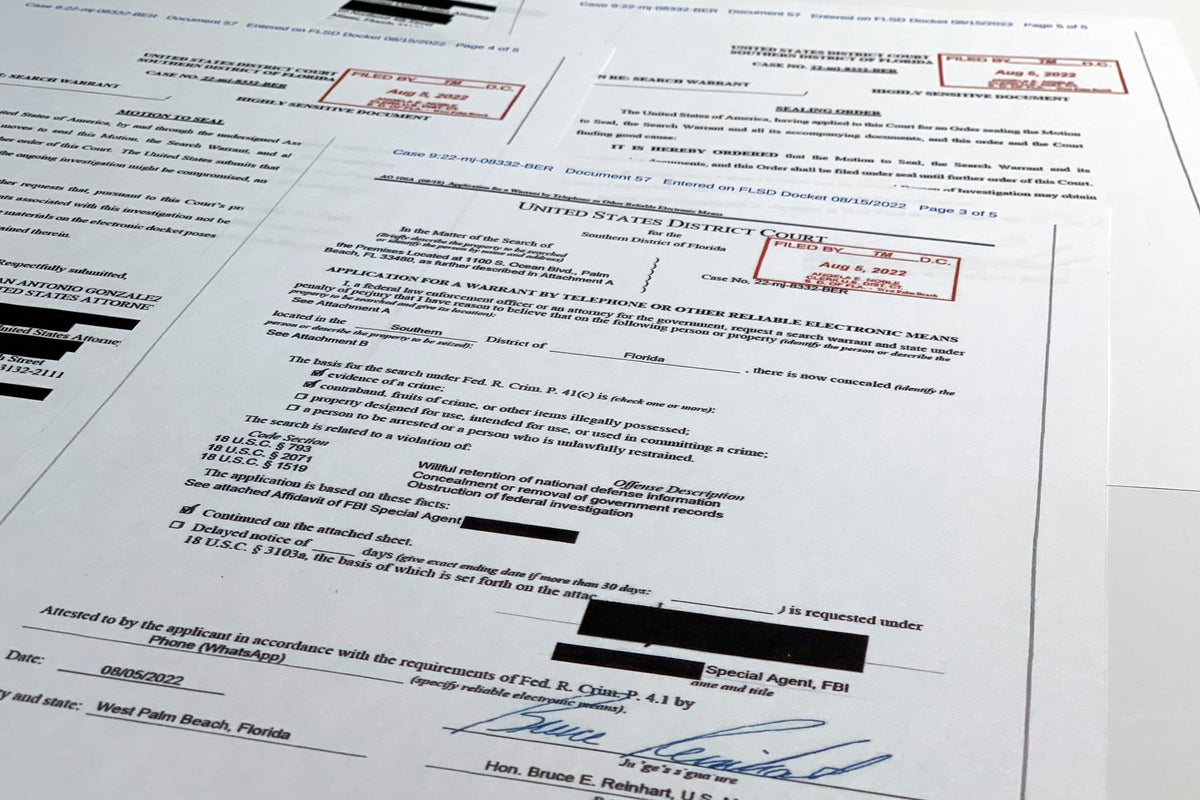
Attorneys for former president Donald Trump have filed a lawsuit seeking to have a third-party known as a special master appointed to review the documents seized from his Florida home and determine whether any should be returned to him because they are shielded by executive or attorney-client privilege.
On 8 August, FBI agents executed a search warrant at Mar-a-Lago, the Palm Beach mansion turned private club where the ex-president maintains his primary residence and post-presidential office. The warrant authorised agents to search his property for “physical documents and records constituting evidence, contraband, fruits of crime, or other items illegally possessed in violation” of several US laws, including the Espionage Act.
A receipt provided to Mr Trump’s attorneys showed that agents recovered roughly 20 boxes, binders containing photos, one handwritten note and the official paperwork granting a presidential pardon to Roger Stone, the GOP operative and provocateur who has been a longtime ally of and adviser to the ex-president.
The boxes contained 11 separate sets of classified documents, including documents marked as top secret and the set of “Top Secret/Sensitive Compartmented Information” documents, the latter of which would have ordinarily required to be viewed in a secure facility known as a SCIF.
Four of the document sets were listed as classified top secret, three were marked as secret, and another three were marked as confidential, the lowest level of classification in the US system.
According to the Department of Justice, the FBI review of documents recovered from Mr Trump’s home is being carried out by a “filter team” of agents who are not working on the case, supervised by a prosecutor who is not working on the case. The “filter team” procedure is meant to keep investigators from viewing any material protected by attorney-client privilege, and is a standard procedure used by federal agents when reviewing documents seized pursuant to search warrants.
But in papers filed with the US District Court for the Southern District of Florida, Mr Trump’s lawyers now claim that the “filter team” procedure is insufficient to prevent the government from gaining access to material protected by attorney-client or executive privileges, despite the fact that multiple courts have ruled that Mr Trump is no longer entitled to claim executive privilege over any documents from his time in the White House.
Mr Trump’s lawyers also claim the entirety of the documents seized from his home and office are “presumptively privileged” under case law dating back to the 1970s if they were “created during his term as President”.
“This step—which the Government itself has requested in cases involving the seizure of privileged and/or potentialy privileged materials—is—needed to preserve the sanctity of executive communications and other privileged materials,” they wrote.
They also argue that the FBI’s “filter protocol” — which was approved at the same time that the warrant itself was approved — is “procedurally deficient” because Mr Trump’s lawyers were not involved in the approval of the warrant, even though attorneys for subjects of criminal investigations are never permitted to argue against the issuance of search warrants.
Mr Trump’s lawyers also devote a significant portion of their court filing to rehashing the ex-president’s grievances with the FBI, including a section with the heading: “The Government Has Long Treated President Donald J Trump Unfairly” in which they argue that Mr Trump should be given information on whether the agents who searched his property participated in prior investigations into whether members of his 2016 campaign had improper contact with Russia’s government.
It’s unclear whether Mr Trump’s demand to halt review of the allegedly stolen government documents will be granted. Many legal experts have said a lawsuit such as the one his attorneys filed on Monday should have been commenced immediately after the search.
A spokesperson for the Justice Department responded to the lawsuit in a statement first obtained by NBC News, explaining: "The Aug. 8 search warrant at Mar-a-Lago was authorized by a federal court upon the required finding of probable cause. The Department is aware of this evening’s motion. The United States will file its response in court."







